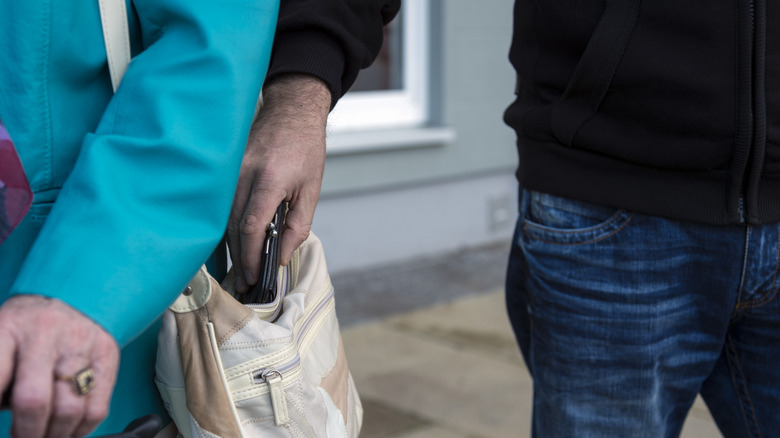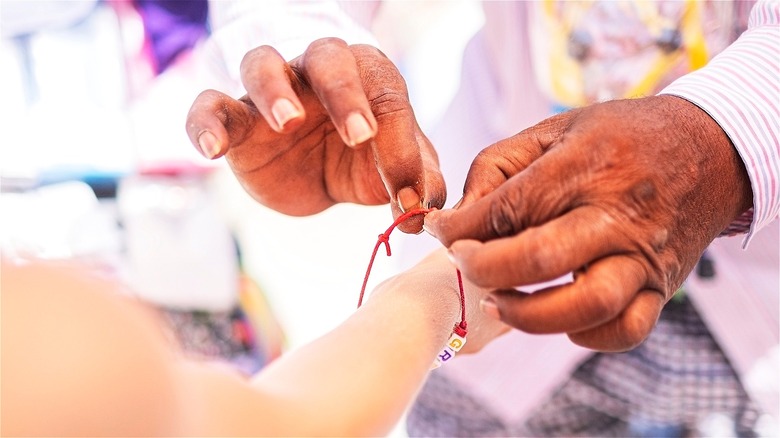This Common Scam Makes You An Easy Target For Pickpockets, According To Rick Steves
Many European countries are among the safest and most welcoming in the world. However, no trip is entirely without risk. There are scammers in all of Europe's capitals looking to get a buck out of you — and they're pretty good at appealing to tourists' curiosity and kindness. General wits and caution should protect you from scammers' tricks, but it's helpful to know some of the most common scams in Europe. One of which is the friendship bracelet scam.
Remember, many criminals go beyond traditional sleight of hand pickpocketing; they invent scenarios designed to confuse, beguile, and deceive. Fortunately, travel writer Rick Steves has seen the scams among the sights and got the measure of Europe's conniving pickpockets. From the friendship bracelet scam to a series of other scenarios you might find yourself in, there's lots to look out for. Steves' insights can help you keep safe and secure when traveling an otherwise friendly and hospitable continent.
Rings, bracelets, and leather jackets
As one of the most common scams in Europe, you want to look out for the friendship bracelet scam when visiting a touristy landmark. It begins by someone approaching you with a friendly smile and a friendship bracelet — first offering it for free. In the absence of a firm "no thanks," they may quickly secure a bracelet to your wrist and ask for a handsome fee in return. You try to remove the bracelet but it's tied tight and the hustler is there, expectant. Scammers may also do this with other small items like roses or souvenirs, and may try to steal other valuables while you're distracted.
Another scenario to be aware of when walking through a disappointing tourist trap, is if a ring falls at your feet. Before you can get a look at it, a stranger picks it up and asks if it belongs to you. "No," you say, as the stranger inspects the ring, leaning in to show you a mark that proves its pure gold. With the trap laid, the scammer will make an enthusiastic sales pitch for a worthless piece of jewelry. No, it's not a happy perk of the trip — it's a scam.
Another one is known as the leather jacket scam. A well-dressed salesperson appears in a car asking for directions. They're friendly, affable, and grateful for your help. So grateful, in fact, that they reach into their car and hand you a "designer" leather jacket. Then comes the last move. The scammer claims their credit card is faulty and asks for gas money. As a generous visitor, you agree and the stranger drives off. You've just paid a premium for a cheap vinyl jacket.
Flirters, fake charities, and street kids
Be sure to look out for the common charity scam. Someone will approach you with a clipboard and a malady of some kind — often deafness — fabricated to elicit sympathy. They'll ask for donations to their invented charitable cause and may even have an accomplice nearby to pickpocket those who don't pay up.
As the sun goes down and Europe's nightlife begins, don't fall for the flirts. These attractive women patrol the street like angler fish, luring flattered men into bars where they'll get drinks on a tab far more expensive than they expected. Protestations are met with bouncers who aren't very good listeners.
Italy's street kids may be less intimidating than a 220-pound bouncer in a sketchy club but they're even more skulduggerous. In Rome, Florence, Milan, and other Italian cities, child gangs roam the streets looking for soft targets. When they find one, the kids swarm them. The best actor will distract the tourist while the others deftly rifle through pockets and bags in search of money and valuables. Staying alert while you explore Europe and keeping your valuables concealed can help you avoid becoming a target for scams.


